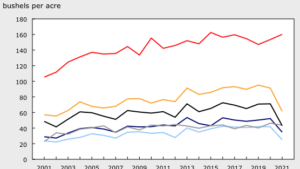
Canada Spearheads Worldwide LLP Efforts
Canada is blazing a trail when it comes to low level presence policy, say seed industry leaders. At a time when some countries are shying away from talks on LLP, Canada’s lines of communication are open with the intent to develop policy that fosters trade, while at the same time ensuring the highest level of food safety.
“Right now, in some importing countries there is a reluctance to move forward on LLP policy issues. Canada is leading that discussion by going through a consultation process and developing a Canadian LLP policy for imports into Canada,” says Will Hill, president of the Flax Council of Canada.
“Canada is leading the way in terms of developing a responsible domestic LLP policy that will help facilitate the free movement of goods between countries without imposing additional risk and without giving up its ability to assess those products as they’re put forward for approval in Canada … By doing that, Canada is certainly leading the way, such that other jurisdictions will have a model within which to deal with the issue,” says Hill.
Todd Hyra, a member of the board of directors for the Canadian Seed Trade Association and SeCan’s business manager for Western Canada, also believes Canada is stepping up to take a leading role in worldwide LLP efforts.
“Canada has been one country that has continued to bring the issue of low level presence to the table because it’s an important issue that needs to be addressed. We are one of the countries in the world that is cautiously taking a step in the right direction,” says Hyra. “The government and industry have been working together over the past couple of years to come up with threshold levels, and I applaud them for taking the necessary steps to work toward something that can be practical and achievable for those involved in the industry.
“Currently, there really is no seed policy that has been adopted, so when something comes up it is assessed case by case, but the industry needs to move forward globally on something that can work for all trading partners. Zero tolerance is not a policy,” he says.
Hill also says zero tolerance is insupportable. “The world just can’t live with zero tolerance. We have tolerances for trace amounts of many substances that are known to be harmful to the health of humans and animals. It seems illogical to me that we don’t have tolerance levels for very low levels of [GM] products that have been approved as 100 per cent safe in one or more jurisdictions, and will in all likelihood be determined safe by science in other jurisdictions as they work their way through the regulatory process,” says Hill.
As long as countries continue to default to zero tolerance policies, trade will continue to be disrupted. “For anyone in the export business, there is the potential for unapproved events to show up in cargos at very low levels. What that does is put the whole export pipeline in jeopardy.”
And Hill understands first-hand the industry-wide crisis that can arise when low levels of unapproved GM products are detected. In 2009, traces of the deregistered and non-commercial GM flax variety CDC Triffid were found in Canadian shipments to Europe, resulting in the immediate cessation of flax trade from Canada to that continent, and even now, despite the progress made in eliminating traces of Triffid from Canada’s flaxseed supply and an extensive and costly testing protocol in place, trade with the European Union is modest when compared with pre-Triffid export levels.
“Our trade has gone from somewhere in the neighbourhood of 400,000 tonnes per year to less than 30,000 tonnes because we’re unable to move that product to Europe in a way that doesn’t put undue risk on the exporter and, for that matter, the importer on the other side.”
Triffid was approved in Canada and the United States, but not Europe. “It’s not a food safety issue, it’s a trade issue. The amount we’re talking about for Triffid is 0.01 per cent. That’s just something the export business cannot deal with. It really causes concerns in terms of [the continuation] of exports,” says Hill.
“If we had a global LLP policy that said if at least one jurisdiction has approved [a GM product] for food and feed using a globally-recognized, science-based risk assessment process, then at a certain level it would be accepted in other jurisdictions, we would be exporting flax to Europe without any testing, without the Farm Stewardship Program, and we certainly would not have suffered this dramatic loss in exports to Europe.”
The cost of zero tolerance has been high, agrees Hyra. “Zero or near-zero blocks trade and causes extraordinary testing costs across grain, seed and all components of the system … As a participant in the forage and seed industry, the lack of global policy has stalled progress and advancement of technology in forages.”
The problem with the LLP policies, or lack thereof, says Hill, is they are not science-based. “They are based on political considerations, jurisdictional concerns, etcetera. It’s really too bad we can’t get together on this issue and [agree] if the United States, for example, says that something is safe at 100 per cent, it should not be a big leap of faith to say something at one per cent, 0.5 per cent or 0.1 per cent is safe. It’s a real lack of faith in science to say that one recognized jurisdiction could be so far off base relative to the rest of the world.”
Part of the problem is a perceived infringement on food safety jurisdiction, says Hill. “Nobody’s asking nations to [give up jurisdiction]. What they’re asking is to allow trade to continue where there are trace amounts—and I’m talking very small amounts—of this product so as to not disrupt trade … It’s 100 per cent safe in one or more countries, there must be a level, a very low level, at which the risk [is acceptable]. We will continue to approve new events throughout the world, and the delay in obtaining approval in all global jurisdictions creates a disconnect,” says Hill.
“That disconnect can be as much as two or three years. That means for two or three years there’s a high risk that you will have a cargo that goes over to one of those jurisdictions with an unintended admixture at a very low level and have that total cargo rejected.”
Again, Canada’s LLP policy could act as a model to assuage fears about food safety regulation. “Canada won’t give up any jurisdictional authority and won’t compromise food safety. When Canada’s policy is fully developed, I think what you’ll see is a policy that shows people that you can actually deal with the problem and still be confident in your ability to regulate and ensure that your population has the highest level of food safety,” says Hill.
Kari Belanger and Shannon Schindle













